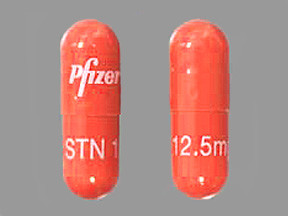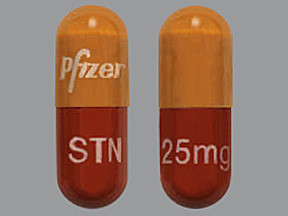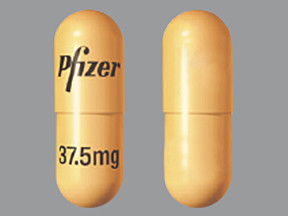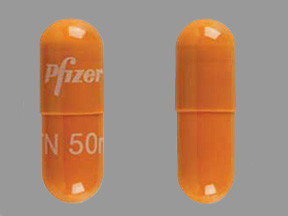SUNITINIB - ORAL
PHONETIC PRONUNCIATION: (soo-NI-ti-nib)
COMMON BRAND NAME(S): Sutent
GENERIC NAME(S): sunitinib malate
Uses
USES: This medication is used to treat certain types of cancer (kidney, pancreas, and intestinal). It is also used to treat people who are at high risk of the kidney cancer coming back again after having kidney surgery. Sunitinib works by stopping or slowing the growth of cancer tumors. It also works by slowing the growth of new blood vessels within the tumor.
How to use SUNITINIB - ORAL
HOW TO USE: Read the Medication Guide provided by your pharmacist before you start taking sunitinib and each time you get a refill. If you have any questions, ask your doctor or pharmacist. Take this medication by mouth as directed by your doctor, with or without food, usually once daily. Drink plenty of fluids during treatment with this medication, unless otherwise directed by your doctor. The dosage is based on your medical condition and response to treatment. For some conditions, you may be directed to take this medication for a specific period of time followed by another period of time off of the drug. For other conditions, you may be directed to take sunitinib every day without a break. Follow your doctor's instructions. Do not increase your dose or take this medication more often without your doctor's approval. Your condition will not improve any faster, and the risk of serious side effects may be increased. Use this medication regularly in order to get the most benefit from it. To help you remember, take it at the same time each day. Avoid eating grapefruit or drinking grapefruit juice while using this medication unless your doctor instructs you otherwise. Grapefruit can increase the amount of certain medications in your bloodstream. Consult your doctor or pharmacist for more details.
Side Effects
Precautions
Interactions
Overdose
Images
Reviews
Faq for SUNITINIB - ORAL
Sunitinib oral is used to treat certain types of cancer, including kidney cancer, gastrointestinal stromal tumors (GIST), and pancreatic neuroendocrine tumors.
Sunitinib oral works by blocking the growth of cancer cells and inhibiting the growth of blood vessels that supply tumors.
Common side effects of sunitinib oral may include fatigue, nausea, diarrhea, stomach pain, skin discoloration, loss of appetite, and high blood pressure.
Sunitinib oral is usually taken once daily with or without food. It is important to follow your doctor's instructions and take the medication at the same time each day.
Sunitinib oral is not approved for use in children. It is typically prescribed for adults only.
If you miss a dose of sunitinib oral, take it as soon as you remember. However, if it is close to the time for your next dose, skip the missed dose and continue with your regular dosing schedule.
Yes, certain foods and drugs can interact with sunitinib oral. It is important to inform your doctor about all the medications, vitamins, and supplements you are taking, as well as any dietary restrictions.
The response to sunitinib oral varies from patient to patient. Some individuals may start to see improvement in their condition within a few weeks, while others may take longer. It is important to continue taking the medication as directed by your doctor.
Sunitinib oral can harm an unborn baby, so it should not be used during pregnancy. It is also not recommended while breastfeeding, as it may pass into breast milk and harm the infant. It is important to discuss any potential risks and benefits with your doctor.
Warning
WARNING: Rarely, sunitinib has caused severe (sometimes fatal) liver problems. Get medical help right away if you develop symptoms of liver problems such as persistent nausea/vomiting, severe stomach/abdominal pain, dark urine, pale stools, or yellowing eyes/skin. Your doctor will monitor for liver problems with blood tests. Tell all of your doctors and pharmacists if you have ever stopped taking sunitinib because of liver problems (including high liver enzymes).
Disclaimer
IMPORTANT: HOW TO USE THIS INFORMATION: This is a summary and does NOT have all possible information about this product. This information does not assure that this product is safe, effective, or appropriate for you. This information is not individual medical advice and does not substitute for the advice of your health care professional. Always ask your health care professional for complete information about this product and your specific health needs.




No Reviews Yet